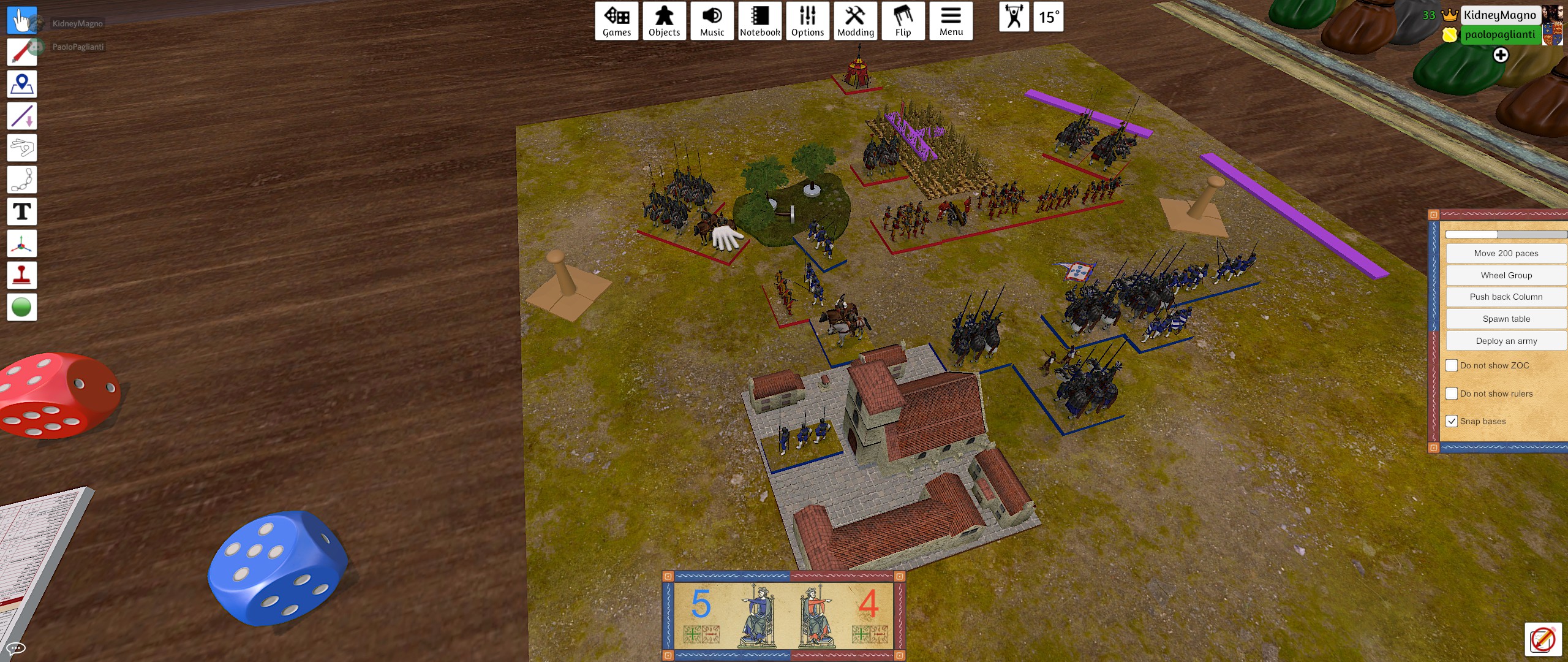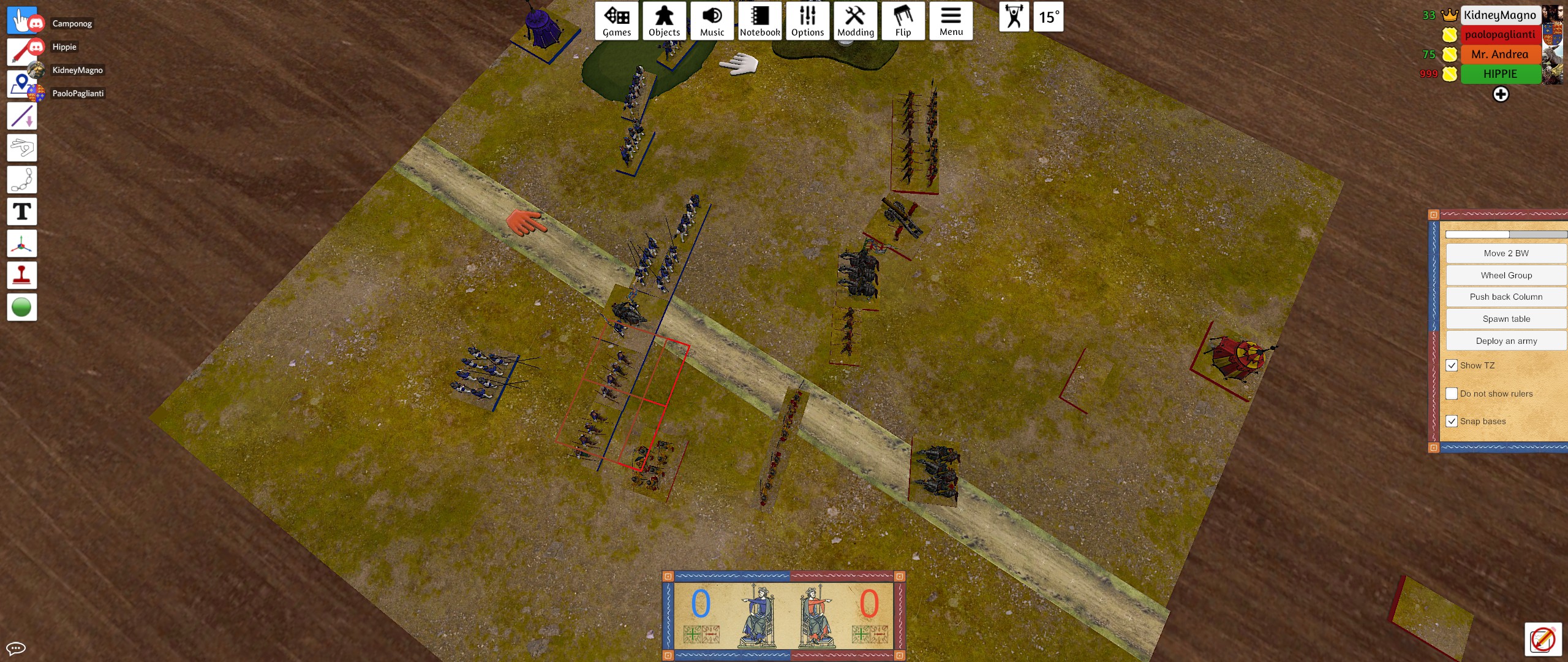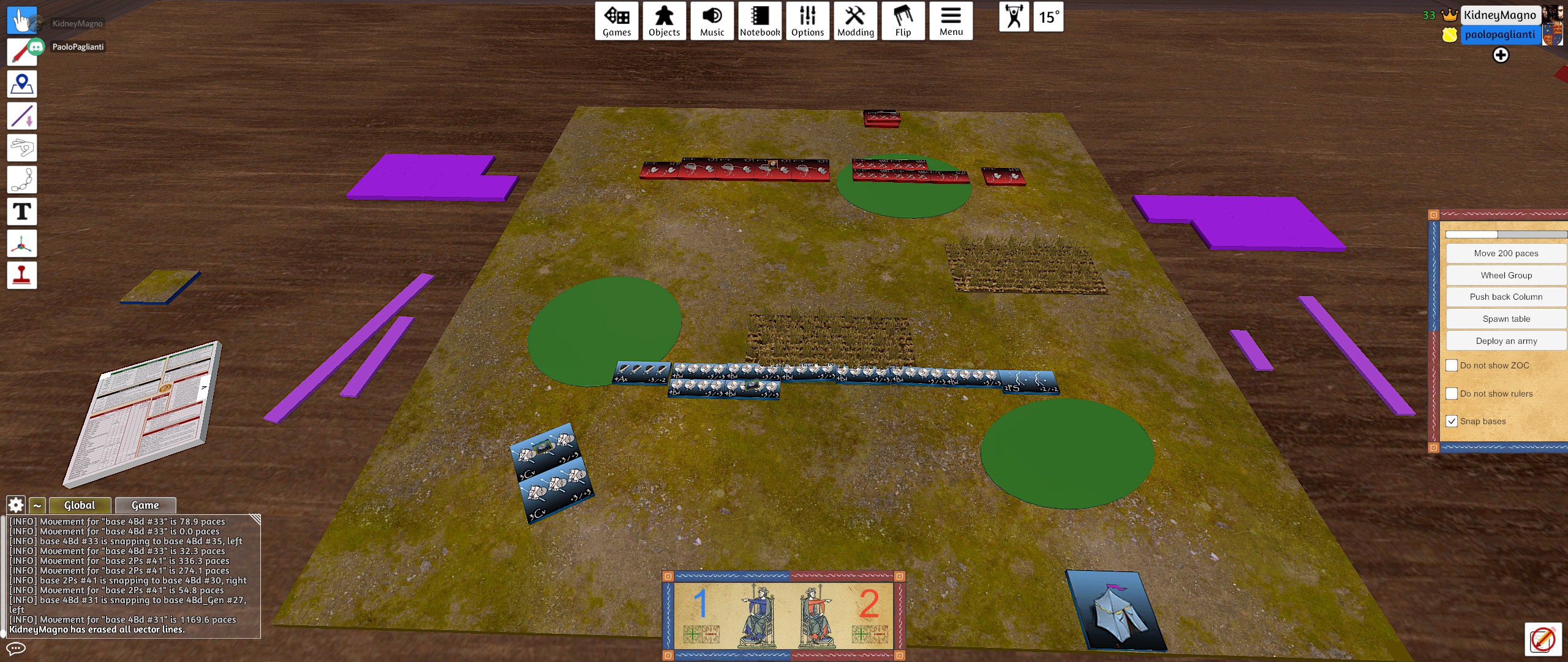Tabletop Simulator: playing 3D wargames with your friends at times of Pandemia
Believe it or not, it’s the first time since I was 16 I haven’t been playing 3D (tabletop miniatures) wargames for 12 weeks. I can’t remember a period so long in which I totally suspended my gaming activity. Even when I got married, or moved from one job to another, or had my newborns, I always managed to sneak in some wargame nights with friends. Probably, a good psychologist could have a say on this, but I am also pretty sure most of you will agree with me.
Even if I am an avid PC gamer (and I also work for a videogame publisher, Slitherine, totally focused on strategy games), I always wanted to play the “physical” game. Collecting the miniatures, painting an army, deploying on the table with a friend and some good beer is something socially unique. For this reason, I never played before the Pandemia. Boys, I did a mistake.
Tabletop Simulator is basically an empty sandbox: it’s the digital equivalent of the room you have at your club. You need the room, but you take the friend to play, the miniatures and the rules. On Tabletop Simulator you can play any game from poker to a board game like Monopoly, to the most complex 3d Wargame you can imagine. Inside the base game you won’t find anything useful besides some dice: to play a game, you need to load the presets from the Workshop.
The Official DLC (Downloadable content) for Tabletop Simulator has a cost, so if you want to play the official Zombicide DLC you need to pay an extra 10 Dollars. However, if you are a 3d wargamer interested in miniature games, you can find tons of material in the free Workshop, a place where players freely share their creations. Anyone can download the materials and set up their games.
The Tabletop Simulator trailer: when it was created, I think nobody – not even its authors – could imagine we would have used this game to play “tin soldier” games with friends across the world.
Let’s play DBA
How does it work? You need to buy (20 dollars US) Tabletop Simulator and install it on a personal computer. Any good decent recent PC will be good, but you need a fast connection to play smoothly (ADSL 20 Mbit or better). You also need a friend who wants to play with you and he also needs the game on his PC.
Once you launch the game, you can use one of the thousands of the expansions already available for free. You can find anything from Saga to Flames of War, or Blood Red Skies to Black Powder and a myriad of other games. We need to create a new server on which our game will happen, choosing the maximum number of players/spectators. If you want to play only with friends, you can set a password.
 Some of the games you can find support: all this material is generally built by players who want to share their creations totally for free
Some of the games you can find support: all this material is generally built by players who want to share their creations totally for free
Under “Workshop” you’ll find the thousands of “sets” already built by players. The game has been for years on Steam, so there is exceptionally strong support. For this test, I have played DBA (ancient period) with my friends Mitch from NDNG and Claudio from Turin: just a few days before writing this feature, the DBA group published the new DBA Scripted 3.0, replacing the “old” same name 2.2 version.
Once you load the free DLC, you have all you need to play – you just need a friend to play. Tabletop Simulator has no AI, no preset rules. It allows you only to deploy the miniatures on a virtual table. You need to deploy the miniatures and to move them. You roll the dices and discover if your Knight killed the Spear or bounces back, like in the “real” game.
 One of my DBA games, Medieval Portuguese vs Italian Condotta. I held the built-up Area on the right and attacked the wood on my opponent’s right with some Auxilia while waiting for the infantry in the centre. Note the menu on the right, with useful tools, and the central counter for the PIPs, the movement orders you have in each bound rolling a D6
One of my DBA games, Medieval Portuguese vs Italian Condotta. I held the built-up Area on the right and attacked the wood on my opponent’s right with some Auxilia while waiting for the infantry in the centre. Note the menu on the right, with useful tools, and the central counter for the PIPs, the movement orders you have in each bound rolling a D6
The DBA 3.0 DLC has however some very interesting tools. For example, the menu on the right allows you to choose any army (they are converting them from 2.2, so it’s a growing list). Once deployed, you can use this menu to do the “wheels” with your miniatures group with extreme exactness or to move them with pixel-precision. You can also use these tools to see the Threat Zone, the area extending in front of any miniature where the enemy is forced to stay still, retreat or attack, or the shooting area of bowmen and artillery.
In the DLC you can also find some quick references – they are like a plastic sheet you can grab and look, like you would in real life at the club. Rulers and plain bases are available, so you can mark the position of a miniature before actually moving it, or use the sticks to check the distances.
 With the new 3.0 free DLC, you can check movements, Threat zones, shooting area simply clicking on a unit. The DBA tool also allows you to measure the movements or the distance with extreme precision
With the new 3.0 free DLC, you can check movements, Threat zones, shooting area simply clicking on a unit. The DBA tool also allows you to measure the movements or the distance with extreme precision
In the first 10 minutes you may feel a bit silly: moving things around in a virtual space is “strange”. However, you’ll soon discover this is a very good way to play with friends you can’t meet in person (due to the pandemic, or because they live in another Continent).
Every time I said “the game should do this”, I discovered it was possible: credit to the players around the world who gave their support and advice to the developers in the past years. For example, you can “block” some features, like hills or rivers, so you don’t unintentionally displace them while you move the miniatures. Do you need to check if the enemy Legionary is within the charge or the shooting arc? You can measure with a virtual rule (both in centimeters and Imperial units!). Any error you do, like move your opponent’s bases, you can “undo” the move.
I played a dozen of DBA games in Tabletop Simulator, and now I’m really excited any time I can play. Using Discord in the background (an App you can install for free on PC or on your mobile) you can talk to your friends while you play. The experience is tremendously similar to that night at the club, playing DBMM with long time friends and chatting over any matter during the game: “Mitch, now I charge with my Blades. By the way, my kids are doing great at schools”; “Ok Paolo, let’s roll the dice. Have you seen The Hole on Netflix?”
You can also flip the table (virtually) if the dice are too bad! (Be sure to save the game right before, so you and your opponent can come back and finish once you’re over your snit at the dice.)
 For some armies, players created the “3d virtual miniatures”. However, a lot of DBA armies are still present as flat bases. The look is worse, but you can understand better the situation.
For some armies, players created the “3d virtual miniatures”. However, a lot of DBA armies are still present as flat bases. The look is worse, but you can understand better the situation.
Right now, I tried both DBA and Saga extensively: these two games have a limited number of miniatures in play (DBA has 12 based for each army, Saga has less than 30 28mm miniatures per side, on the average). With these scales, Tabletop Simulator is a total win experience. The games are smooth, you can play a full game in an hour, and you never mess up too much. I’m going to try to play DBA with four armies (two same armies for side, to double the scale) to be closer to greater size DBMM.
Tabletop Simulator allows me to play games with friends I can’t meet for the present situation, like Claudio, but also with friends like Mitch (my boss here at NoDiceNoGlory) who I can’t easily meet in the real world, being separated by an Ocean. For this reason, I strongly believe TTS will stay on my computer for a long time, even when the lockdown will be lifted.
If you want to have a look, write it in the comments: we could set up a demo next week, streaming the game through the NDNG Discord group so you can see the game in progress before buying or installing on your PC, and chatting with us.
